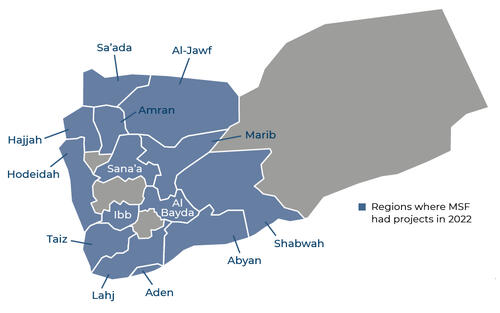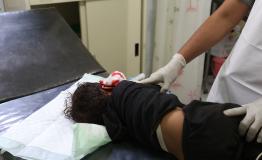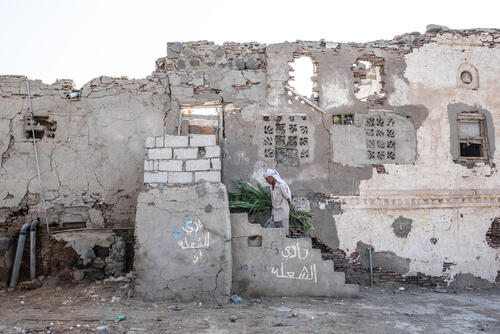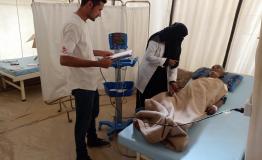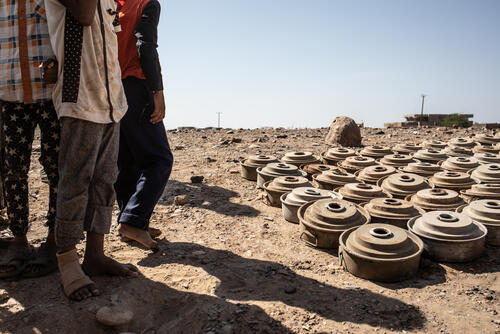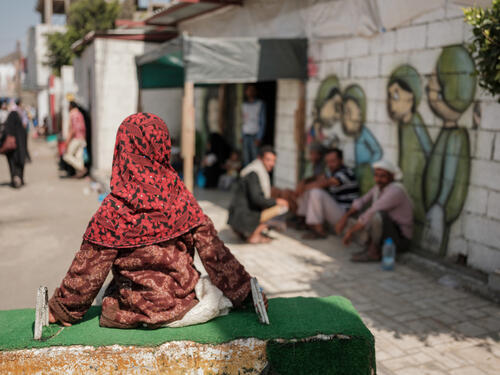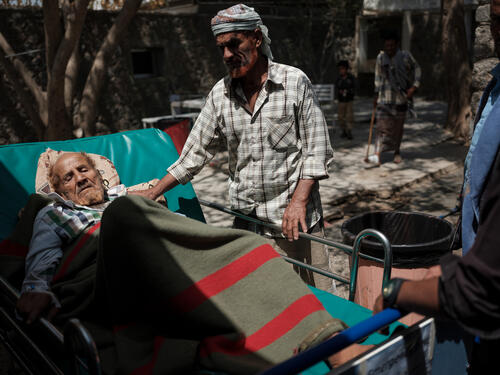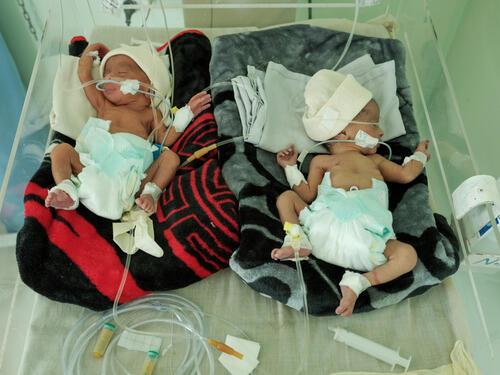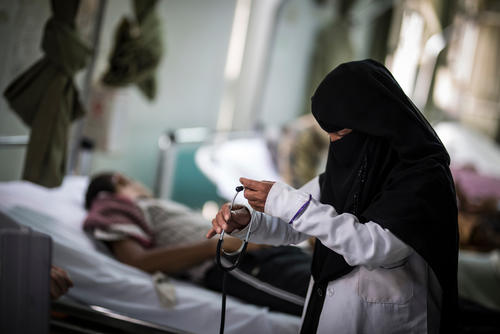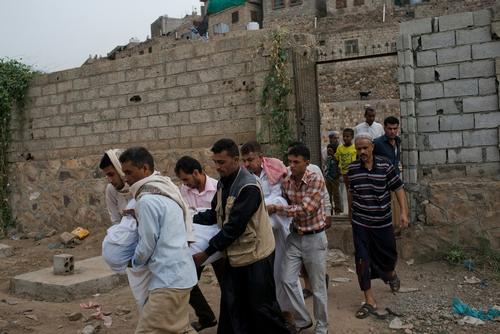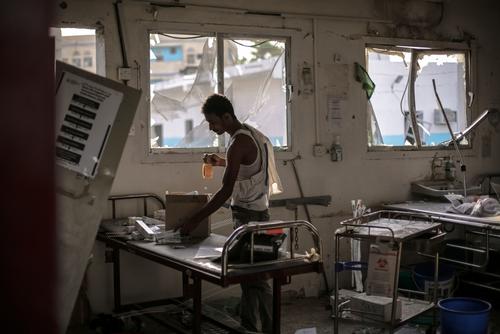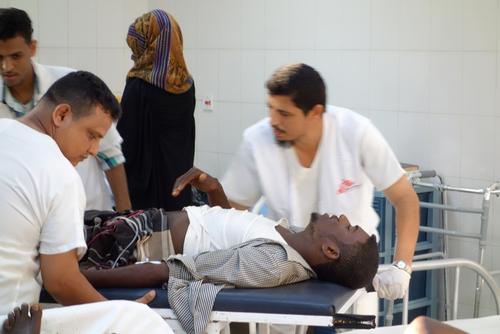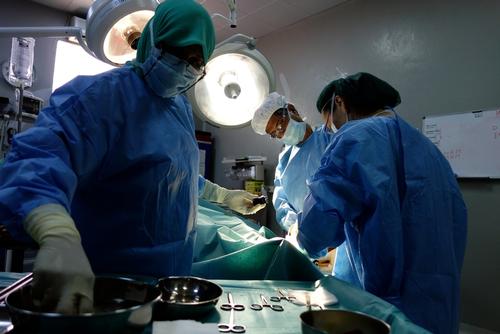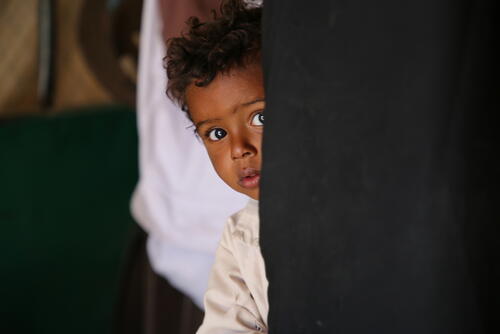In early 2022, in response to a dramatic escalation in fighting across several frontlines and a significant increase in airstrikes, our teams in Abs, Mocha and Sa’ada launched multiple mass-casualty interventions.
Although the conflict has reduced in intensity since the UN-brokered truce in April, sporadic clashes continue to break out on frontlines, often resulting in casualties among civilians caught in the crossfire or exposed to unexploded ordnance.
Yemen’s humanitarian crisis is driven by armed conflict, but the consequent deterioration of the economy has also had a direct impact on people’s living conditions, health and access to essential treatment. As food and fuel prices continue to rise, many families cannot afford to eat or travel to healthcare facilities.
The availability of healthcare in Yemen, in particular high-quality, affordable basic medical services at community level, is diminishing, and in some cases is non-existent. As we have seen in the health facilities we support, poor access to general medical care means that many people delay seeking treatment or are forced to travel further afield, so that by the time they arrive, they are often in a worse condition and have developed complications.
A large number of people in Yemen remain in dire need of humanitarian assistance and support, amid a marked deterioration in services that leads to increasing gaps in healthcare. The situation has been compounded by asymmetric restrictions imposed by the Yemeni authorities on humanitarian staff and supplies, which have hampered the effective and timely delivery of essential aid. MSF continues to call for a greater, more efficient and more direct international response in Yemen, and calls for the facilitation of access to vulnerable people for MSF and other humanitarian organisations.
In 2022, our teams worked in 12 hospitals and supported 16 other health facilities across 13 governorates, with a focus on inpatient and emergency care. However, given the lack of basic healthcare in rural areas, the hospital wards MSF supports are often overwhelmed, as people tend to arrive with complications because they were unable to receive care when they needed it. As a result, the facilities we support often operate at well over 100 per cent capacity. We therefore provide assistance to basic healthcare centres in several locations across the country, including financial support for healthcare workers, training, donations of medications, and payment for referrals to facilities run or supported by MSF.
Malnutrition
In Yemen, malnutrition is a persistent risk to children, pregnant women, and people in a heightened state of vulnerability due to medical conditions, with seasonal and annual peaks linked to the lean season between harvests. This pattern was seen before the escalation of the war in late 2014, but it has worsened and become more widespread due to the ongoing conflict, which has exacerbated food insecurity for people living in vulnerable conditions.
In 2022, the malnutrition peak started earlier than other years and did not finish until November. MSF-supported facilities were overwhelmed by the high numbers of patients, with over 10,000 receiving treatment over the course of the year. Our teams launched emergency interventions to address the surge in acute malnutrition cases and compounding health complications, and are particularly concerned with associated waterborne diseases, which increase the fragility of under-fives, especially when already malnourished.
Emergency and surgical care
During the year, MSF-supported emergency rooms in Yemen treated hundreds of thousands of patients, many with violence-related injuries incurred during the conflict. Many other people ended up needing emergency care for conditions that had initially been less serious, but had worsened because the lack of affordable healthcare in their communities meant they delayed seeking treatment.
Our teams performed thousands of surgical interventions in 2022, not only for violence-related injuries, but also for emergencies such as obstetric complications. They also treated a significant number of road traffic accidents in various locations in Yemen. Poor availability of maternal care resulted in high numbers of women facing complications in childbirth and increased risks to both mother and child; often this is because treatment is received too late.
Maternal and child care
MSF provides support for maternal and child healthcare in most governorates in Yemen, where there is an ever-increasing demand for such services. Our teams assisted with deliveries, including caesarean sections, and provided both antenatal and neonatal care. In an effort to reduce the high maternal and infant death rates, we worked with the Ministry of Health in Hodeidah, Hajjah, Ibb and Taiz governorates, to develop emergency referral pathways to accelerate access to care.
Low vaccine coverage and preventable diseases
We have seen a resurgence of preventable diseases, such as cholera, diphtheria, measles and whooping cough in Yemen due to low vaccination coverage, poor living conditions and the collapse of the healthcare system. In response, our teams provided vaccinations, carried out health promotion and education activities to encourage people to take vaccinations, and also managed disease isolation centres.
